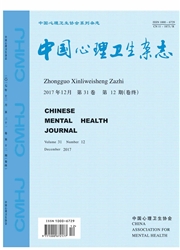

 中文摘要:
中文摘要:
目的:探讨睡眠剥夺对于背景记忆的影响。方法:将32名青年被试随机分为四组,分别为剥夺睡眠21小时、45小时、69小时和正常对照组,每组被试8名。正常对照组在早8:00,进行测试;睡眠剥夺组自第一天早7:00进入实验室开始剥夺睡眠,分别在第2天、第3天和第4天凌晨4:00离开实验室。测试为词汇背景记忆测验,通过按键反应,要求被试首先再认是否为旧词,再判断旧词的颜色。结果:除45小时组和69小时组漏过率外,同一组内背景记忆成绩低于再认(P〈0.05);剥夺45小时后,与对照组比再认正确率下降(80.26±7.14/92.60±4.31,F=44.213,P=0.000)、漏过率增加(10.44±3.01/3.60±0.58,F=13.667,P=0.000)、反应时延长(0.71±0.25/0.65±0.16,F=22.315,P=0.000);而SD21后,与对照组比背景记忆正确率下降(62.23±7.71/80.10±8.21,F=31.54,P=0.027)、漏过率增加(9.69±3.11/5.83±2.47,F=3.712,P=0.028)、反应时延长(0.93±0.18/0.89±0.24,F=3.093,P=0.027)。结论:睡眠剥夺后再认和背景记忆成绩下降,并随睡眠剥夺时间的延长成绩下降更加明显;睡眠剥夺对背景记忆的影响更大。
 英文摘要:
英文摘要:
Objective: To investigate effects of sleep deprivation on words contextual memory. Methods: 32 young males were divided into four groups, SD21 ( sleep deprivation for 21 hours) , SD45, SD69 and Control, 8 males each group. Control group was tested on 8 : 00, Sleep deprivation began from 7 : 00 in the morning of first day, ended at 4 : 00 of the second day, the third day and the fourth day differently. Then words contextual memory test was administered. Subjects were asked to recognize the old words and judge the color of it by pressing the keyboard. Results: Except missing rates of SD45 and SD69, the performance of contextual memory was worst than that of recognition in the same group. For recognition, after SD45, right rates decline (80. 26±7.14/92. 60 ±4. 31, F=44. 21, P=0. 000), missing rates ( 10. 44±3.01/3.60±0. 58, F = 13. 667, P = 0. 000 ) , responsing time prolonged ( 0. 71 ± 0. 25/ 0. 65 ± 0. 16, F = 22. 315, P = 0. 000 ) . For contextual memory, after SD21, right rates decline (62. 23±7. 71/ 80. 10±8.21, F=31.54, P=0.027), missing rates (9.69±3. 11/5.83±2.47, F=3.712, P=0.028), responsing time prolonged (0. 93 ± 0. 18/0. 89 ± 0. 24, F = 3. 093, P = 0. 027 ) . Conclusion: Results of recognition and contextual memory decline after SD and decline more SD has more effects on contextual memory.
 同期刊论文项目
同期刊论文项目
 同项目期刊论文
同项目期刊论文
 期刊信息
期刊信息
